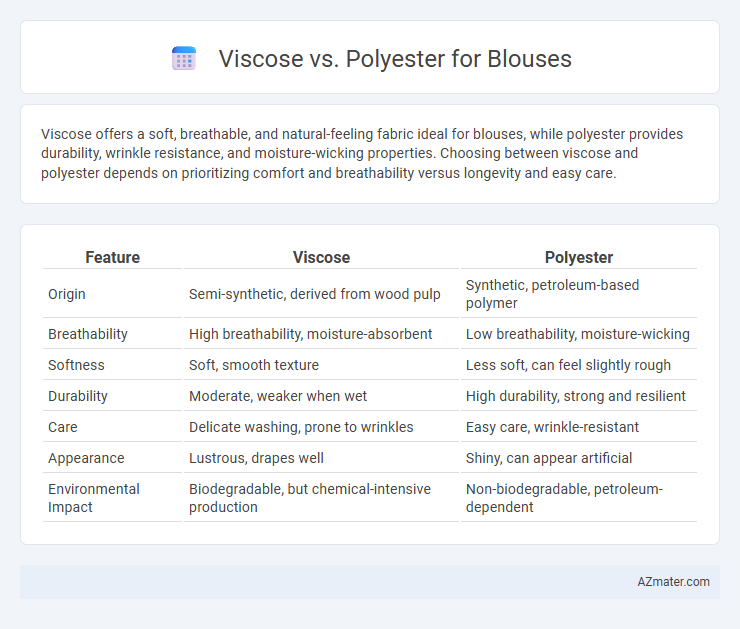Viscose offers a soft, breathable, and natural-feeling fabric ideal for blouses, while polyester provides durability, wrinkle resistance, and moisture-wicking properties. Choosing between viscose and polyester depends on prioritizing comfort and breathability versus longevity and easy care.
Table of Comparison
| Feature | Viscose | Polyester |
|---|---|---|
| Origin | Semi-synthetic, derived from wood pulp | Synthetic, petroleum-based polymer |
| Breathability | High breathability, moisture-absorbent | Low breathability, moisture-wicking |
| Softness | Soft, smooth texture | Less soft, can feel slightly rough |
| Durability | Moderate, weaker when wet | High durability, strong and resilient |
| Care | Delicate washing, prone to wrinkles | Easy care, wrinkle-resistant |
| Appearance | Lustrous, drapes well | Shiny, can appear artificial |
| Environmental Impact | Biodegradable, but chemical-intensive production | Non-biodegradable, petroleum-dependent |
Introduction to Viscose and Polyester Blouses
Viscose blouses, made from semi-synthetic fibers derived from cellulose, offer breathability and a soft, silky texture ideal for warm weather. Polyester blouses consist of fully synthetic fibers known for durability, wrinkle resistance, and moisture-wicking properties, making them low maintenance and long-lasting. Choosing between viscose and polyester depends on preferences for comfort, aesthetic, and ease of care.
Fabric Composition: What is Viscose?
Viscose is a semi-synthetic fiber made from regenerated cellulose, primarily derived from wood pulp, offering a soft, breathable, and lightweight fabric ideal for blouses. Unlike polyester, which is fully synthetic and petroleum-based, viscose provides natural moisture absorption and a silky feel, enhancing comfort during wear. Its fabric composition allows for excellent drape and color retention, making viscose blouses popular for both casual and formal attire.
Fabric Composition: What is Polyester?
Polyester is a synthetic fabric made from petroleum-based polymers, known for its durability, wrinkle resistance, and quick-drying properties. Unlike viscose, which is derived from natural cellulose fibers, polyester offers higher tensile strength and greater resistance to shrinking and stretching. Its fabric composition makes it a popular choice for blouses requiring easy care and long-lasting wear.
Texture and Feel: Comfort Comparison
Viscose offers a soft, breathable texture that mimics natural fibers, providing a smooth and lightweight feel ideal for all-day comfort. Polyester, characterized by its synthetic, slightly slick texture, tends to retain heat and may feel less breathable, causing discomfort in warm weather. Viscose blouse fabrics excel in moisture absorption and softness, whereas polyester blouses are more wrinkle-resistant and durable but can sacrifice comfort for performance.
Breathability and Moisture-Wicking Properties
Viscose offers superior breathability compared to polyester, making it ideal for blouses in warm weather due to its natural fiber composition that allows air circulation and moisture absorption. Polyester, a synthetic fiber, excels in moisture-wicking properties by pulling sweat away from the skin and drying quickly, which benefits active wear or humid conditions. Choosing between viscose and polyester depends on whether breathability or moisture-wicking is prioritized for comfort and performance in blouse fabrics.
Durability and Longevity in Daily Wear
Viscose offers a soft, breathable texture ideal for comfort but tends to have lower durability and may degrade faster with frequent washing compared to polyester. Polyester excels in longevity due to its strong synthetic fibers, resisting stretching, shrinking, and wrinkles, making it highly suitable for daily wear blouses. Choosing polyester ensures better maintenance of shape and color over time, while viscose requires careful handling to preserve fabric integrity.
Maintenance and Care Instructions
Viscose blouses require gentle hand washing or delicate machine cycles with cold water to prevent shrinking and fabric damage, and they benefit from air drying to maintain texture and shape. Polyester blouses are more durable and low-maintenance, allowing for machine washing in warm water and fast tumble drying without significant risk of shrinking or wrinkles. Both fabrics should be ironed on low heat; however, viscose requires extra caution to avoid heat damage, while polyester is more resistant to wrinkling and color fading.
Sustainability and Environmental Impact
Viscose is a semi-synthetic fiber derived from renewable wood pulp, but its production often involves harmful chemicals and significant water usage, raising concerns about deforestation and pollution. Polyester, a synthetic fiber made from petroleum, consumes less water but relies on non-renewable fossil fuels and contributes to microplastic pollution during washing. Choosing between viscose and polyester for blouses requires balancing the impacts of deforestation and chemical use against fossil fuel dependency and plastic waste.
Price Differences and Affordability
Viscose blouses typically cost more than polyester due to higher production expenses and the fabric's natural semi-synthetic origin. Polyester offers greater affordability and budget-friendliness, making it a common choice for everyday blouses and mass-market clothing. Price differences reflect material durability and texture, with viscose providing a softer feel at a premium, while polyester excels in cost-effective versatility.
Which is Better for Blouses: Viscose or Polyester?
Viscose offers superior breathability and a soft, natural feel, making it ideal for lightweight, comfortable blouses that drape elegantly. Polyester boasts higher durability, wrinkle resistance, and color retention, providing easy-care benefits and long-lasting vibrancy for daily wear. Choosing between viscose and polyester depends on whether comfort and natural texture or durability and low maintenance are the primary priorities for your blouse.

Infographic: Viscose vs Polyester for Blouse
 azmater.com
azmater.com